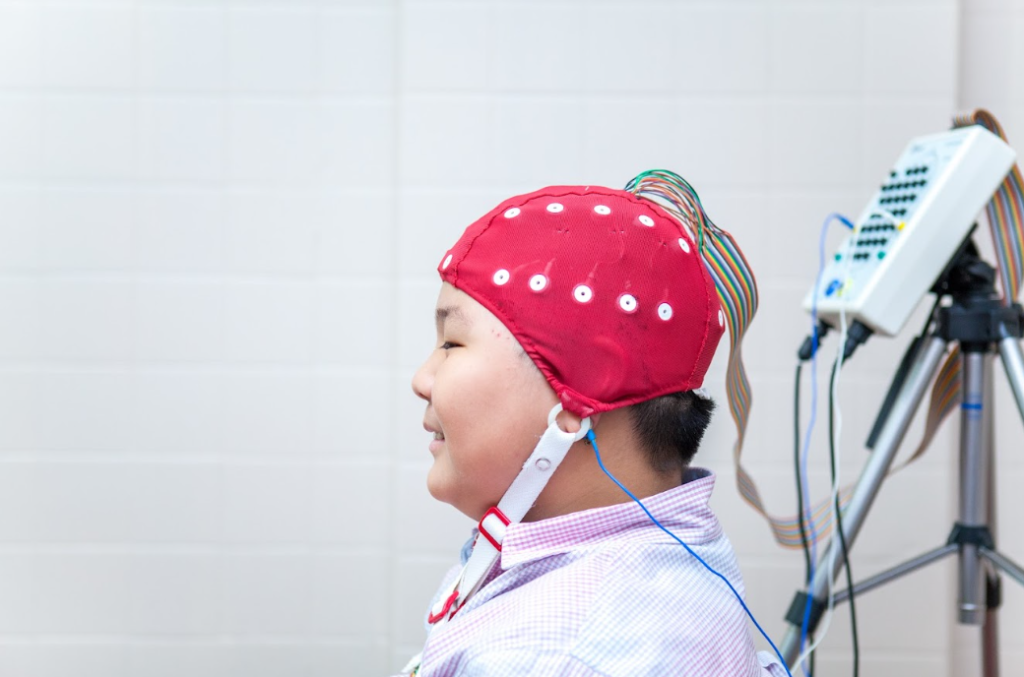Focus – is the superpower that propels us through exams, work projects, and life’s challenges. When it comes to children, it becomes even more important as they learn the ropes of academic excellence and social interactions. Imagine your child effortlessly concentrating in class, processing information, and completing homework without distractions. Sounds like a dream? It could be a reality with neurofeedback therapy (NF). Read on to find out more about NF and how it can help improve child focus.
Why Focus Matters in the Classroom
Focus and concentration are crucial for effective learning. When children can focus, they are more likely to stay engaged and motivated. Not only can they immerse themselves in subjects that interest them, leading to a deeper understanding, but they can also retain what they have learned. This leads to better performance on tests, homework, and classroom activities.
Furthermore, concentration is key to developing critical thinking and problem-solving skills. This cognitive process is essential for success in both academic and real-world situations. Self-regulation also closely correlates with focus. Children who can focus well are more likely to exhibit better behaviour and self-control.
As parents and children now live in a highly digitalised world, the opportunity for sustained attention is ever-dwindling. Some research also suggests that multitasking in digital environments can significantly impact concentration and attention in children, making focus-related supplementary activities and therapies even more crucial for better learning and engagement. The following notable indicators may suggest that your child can benefit from additional support to enhance their focus and concentration skills:
- Short attention span
- Difficulty staying on task
- Difficulty following directions
- Impulsivity: acting without thinking, leading to mistakes and incomplete tasks
- Poor time management: struggling to organise and complete assignments
- Language processing: challenges with understanding and processing information effectively.
- Anxiety and stress: emotional regulation problems that affect focus.
While traditional methods like tutoring or behavioural therapy can certainly offer some relief, neurofeedback therapy presents an alternative approach that addresses the root of the issue—the brain itself.
Neurofeedback Therapy: Brain Training for Sharper Focus
Neurofeedback is a technique that trains the brain to self regulate the brainwaves. It works by providing real-time information about brain activity, allowing individuals to train their brains to improve focus, attention, and overall cognitive functions.
In simple terms, it’s like equipping your child with a personal trainer for the mind. Breaking it down further, if we compare our brain to a fine-tuned orchestra, neurofeedback therapy helps harmonise the different brainwave patterns, creating a symphony of focus.
This enhanced brain function can lead to various benefits including:
-
- Sharper focus and a better attention span: better concentration and fewer distractions
-
- Reduced impulsivity: better control over actions and reactions.
-
- Improved productivity: efficient and effective task completion
-
- Better learning outcomes: more effective information absorption and processing.
- Reduced stress and anxiety: a calmer and more composed mind.
How Neurofeedback Therapy Works
The process begins with an initial qEEG (quantitative electroencephalogram) assessment where a therapist records the child’s brainwave activity using a qEEG cap placed on the scalp. This non-invasive method records the brain’s electrical activity, subsequently analysing it to identify any irregular patterns.

Once the monitoring and analysis is complete the therapist will schedule a follow up session with the parents/ guardians to share their findings and to draw up a personalised therapy plan based on the specific needs and requirements.
During neurofeedback (NF) training, a trainee will participate in an activity similar to a computer game, designed to meet his/her specific training needs. To continue progressing in the game, the trainee must maintain the desired brainwave patterns. Each time the trainee successfully sustains this brainwave pattern, he/she earns a point; however, if his/her brainwaves deviate from the targeted pattern, no points are awarded. Gradually, the brain will learn to recognise these reward signals and work towards maintaining the desired brainwave patterns in order to earn more rewards, effectively training itself along the way.
NF typically involves multiple sessions, depending on the child’s needs and progress. Each session lasts about 40-50 minutes. It’s important to maintain consistency and attend sessions regularly to achieve the best results.

Neurofeedback Therapy as Dyslexia Treatment Programme
For children with dyslexia, neurofeedback therapy can be a valuable addition to traditional dyslexia treatment programmes such as the Orton-Gillingham (OG) method. The OG method is a well-established, structured, sequential, and multisensory technique that emphasises the understanding and application of the alphabetic principle—the relationship between letters and sounds. By preparing the brain to be more receptive to learning and focus, neurofeedback can maximise the benefits of the OG method, helping children with language, comprehension, and processing challenges.
It is important to note that neurofeedback is not a quick fix. It’s an investment in your child’s long-term success. Regular sessions over several weeks are typically required to achieve optimal results.
Success Stories and Research
Numerous studies and anecdotal reports highlight the effectiveness of neurofeedback in improving focus and attention in children. For example, in the Journal of Attention Disorders, a study revealed significant improvements in attention and behavioural control in children who received NF compared to those who did not receive the therapy.
Parents also frequently share success stories of how NF has transformed their child’s ability to focus, reduced hyperactivity, and improved academic performance. These positive outcomes underscore the potential of NF as a powerful tool for supporting children with attention difficulties.
Finding the Right Neurofeedback Therapist
When considering neurofeedback therapy for your child, it is crucial that you choose a qualified neurofeedback therapist who specialises in this field. Look for professionals with experience working with children and a solid understanding of neurofeedback techniques. A qualified therapist will tailor the neurofeedback sessions to meet your child’s specific needs, be it ADHD, ASD, or dyslexia-related. Ensuring a personalised approach can enhance the effectiveness of the therapy.
By choosing neurofeedback therapy as a focus programme for children, you’re empowering your child with a tool to unlock their full potential. It’s an investment in their future success and overall well-being.
Explore NF Therapy with Spectrum Learning
Don’t let focus-related challenges hold your child back from reaching their full potential. Neurofeedback therapy offers a non-invasive, drug-free approach to improving brain function and learning focus. With dedication and the right treatment plan, your child can develop the focus skills they need to thrive in school and beyond. If you are a parent interested in exploring NF further, reach out to our specialists at Spectrum Learning today. With consistent treatment and support, neurofeedback therapy can make a significant difference in your child’s ability to succeed in school and beyond. Book a consultation and take the first step towards a brighter future for your child.
Disclaimer: This blog post is intended for informational purposes only and does not constitute medical advice.

